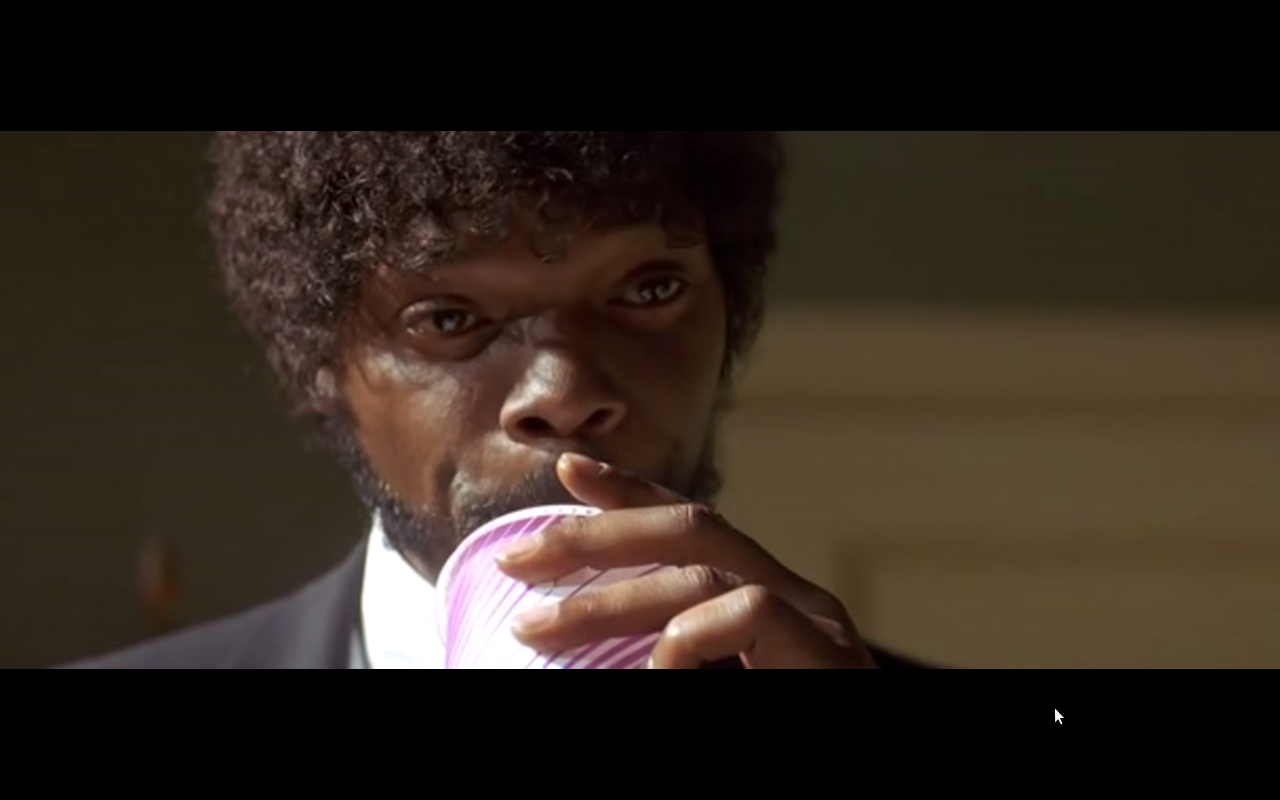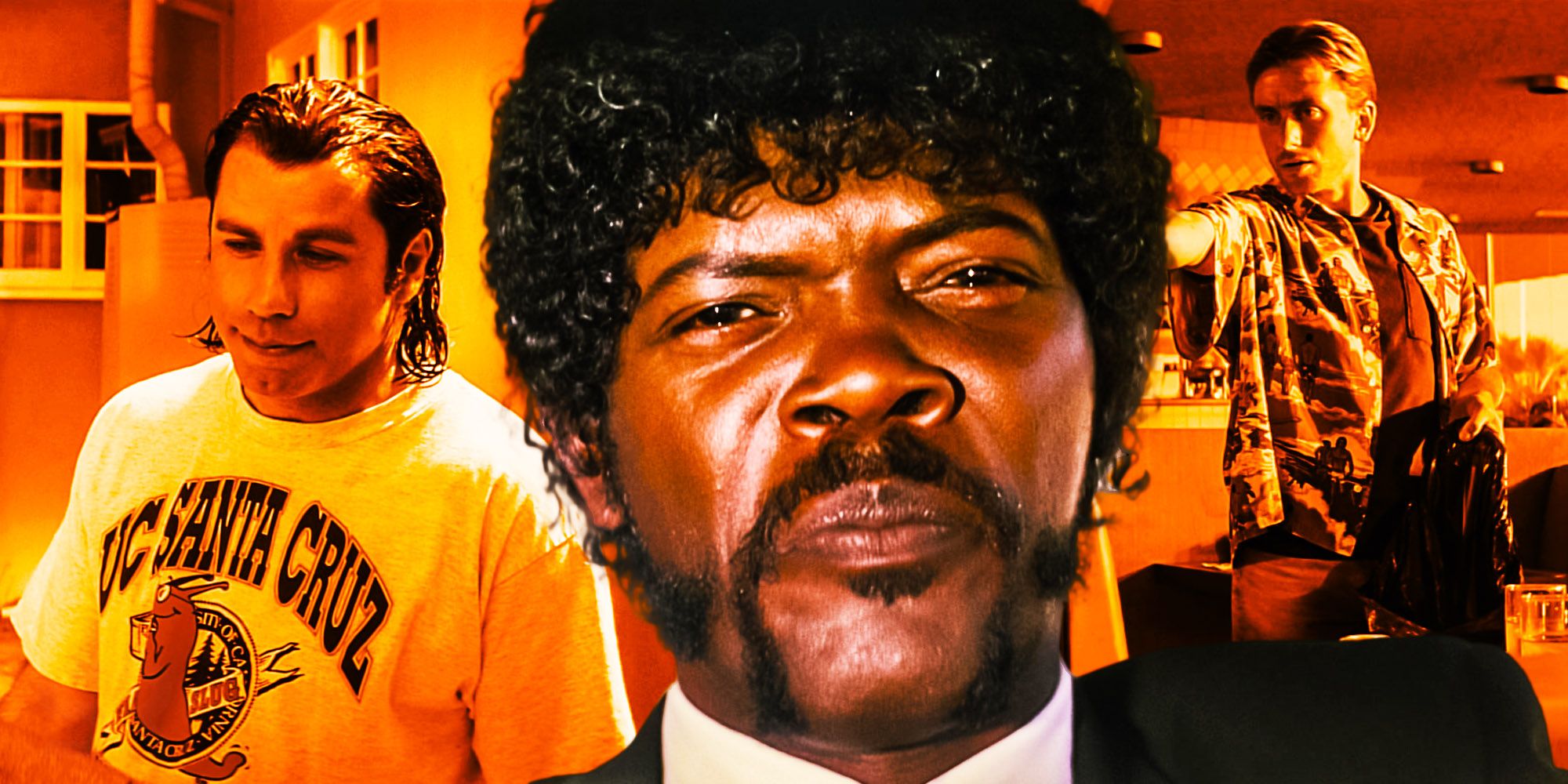Samuel L. Jackson's Iconic Pulp Fiction Bible Verse: Unpacking Ezekiel 25:17's True Origins
There's a moment in the movie Pulp Fiction that just stays with you long after the credits roll, isn't there? It’s a scene that’s pretty much etched into the minds of film lovers everywhere. That’s the point where Samuel L. Jackson's character, Jules Winnfield, calmly delivers a line that, for all the world, sounds like a bible passage. It's a speech that’s become legendary, you know, almost as famous as the film itself. People quote it all the time, sometimes without even realizing where it comes from.
This particular piece of dialogue, often called "Ezekiel 25:17," is one of the most recognizable parts of Quentin Tarantino's 1994 cult classic. It's a moment of intense quiet before a storm, a sort of philosophical preamble to some very brutal actions. You can just feel the tension build as Jules speaks, right?
So, what exactly are the origins of this classic 'Pulp Fiction' quote? And how close did Tarantino really get to the original Bible passage? We’re going to get into all of that, exploring the words that Samuel L. Jackson made famous and their fascinating journey from script to screen and beyond.
- Matthew Mcconaughey Hair
- Jared Keeso Net Worth
- Josh Dun Net Worth
- Rex Ryan Net Worth
- Michael Keaton In 1988
Table of Contents
- Samuel L. Jackson: A Brief Look at the Man Behind Jules
- The Scene That Shook Us All
- The Legendary Ezekiel 25:17 Dialogue
- Bible Verse or Tarantino Magic: The True Origins
- Quentin Tarantino's Writing Process and Roger Avary's Contribution
- Jackson the Actor: The Performance, The Impact
- The Enduring Legacy and Anniversary Celebrations
- Frequently Asked Questions About Jules' Quote
Samuel L. Jackson: A Brief Look at the Man Behind Jules
Before Pulp Fiction, Samuel L. Jackson was, in a way, everywhere and nowhere at once. He had done a lot of work, but this film really launched him into superstardom. His portrayal of Jules Winnfield, a hitman with a surprising philosophical side, pretty much became an instant favorite for many. It was a role that showed off his incredible range and presence, you know?
Personal Details & Bio Data
| Detail | Information |
|---|---|
| Full Name | Samuel Leroy Jackson |
| Birth Date | December 21, 1948 |
| Birth Place | Washington, D.C., U.S. |
| Occupation | Actor, Producer |
| Notable Role (Pulp Fiction) | Jules Winnfield |
| Years Active | 1972–present |
The Scene That Shook Us All
On May 21, 1994, Pulp Fiction was unveiled to the world, making its debut at the Cannes Film Festival. This independent crime film, written and directed by Quentin Tarantino from a story he conceived with Roger Avary, quickly became a sensation. It tells four intertwining tales of crime and consequence, and it’s truly a wild ride.
Among its many memorable scenes, quotes, and characters, the one featuring Jules Winnfield's "Ezekiel 25:17" speech stands out. It's a powerful moment, you see, where Jules confronts some young men who have double-crossed his boss. He doesn't just shoot them; he delivers this chilling, almost poetic monologue first. It’s pretty unsettling, actually, the way he blends what sounds like a bible verse with the impending violence.
- Ryan Gosling Is Obama
- Michael Keaton Shows
- Jonathan Cheban Net Worth
- Samuel L Jackson Pink Wig
- Verne Troyer Net Worth
This scene, with Jules' calm yet menacing delivery, really explores how "Ezekiel 25:17" in Pulp Fiction manages to blend a bible verse with themes of vengeance and judgment. It’s a very intense setup, giving us a glimpse into Jules’ complex character.
The Legendary Ezekiel 25:17 Dialogue
If you're a fan of Pulp Fiction, you probably know this by heart. If you can’t quite remember the text of Ezekiel 25:17, that bible verse Jules (Samuel L. Jackson) uses before he shoots someone, here it is:
"The path of the righteous man is beset on all sides by the inequities of the selfish and the tyranny of evil men. Blessed is he who, in the name of charity and good will, shepherds the weak through the valley of darkness, for he is truly his brother's keeper and the finder of lost children. And I will strike down upon thee with great vengeance and furious anger those who would attempt to poison and destroy My brothers. And you will know My name is the Lord when I lay My vengeance upon thee."
This entire quote, spoken with such gravitas by Jackson, has become an iconic piece of cinema history. It’s a moment that defines Jules, offering a glimpse into his warped moral code, you know? It’s pretty compelling stuff.
Bible Verse or Tarantino Magic: The True Origins
So, does a famous Ezekiel 25:17 speech in the film quote a real Bible verse? This is a question many people ask, and it’s a good one. The truth is, while a version of Ezekiel 25:17 is famously quoted by hitman Jules Winnfield, the entire quote used is not only from Ezekiel. Jules, it turns out, got his facts a little bit wrong on this one.
The actual Bible verse, Ezekiel 25:17, is much shorter and has a slightly different tone. It typically reads something like: "And I will execute great vengeance upon them with furious rebukes; and they shall know that I am the Lord, when I shall lay my vengeance upon them." You can see, then, that Tarantino took some significant creative liberties.
The film’s version is, in fact, a somewhat loose adaptation, blending elements from the actual Bible passage with other biblical-sounding phrases, and quite a bit of original writing. It’s a very clever way to make the dialogue sound authentic and profound, even if it’s not literally from the scriptures. This blend is what makes it so memorable, in a way.
Quentin Tarantino's Writing Process and Roger Avary's Contribution
The "Ezekiel 25:17 (dialogue)" was primarily written by Quentin Tarantino, though it's important to remember that the story for Pulp Fiction was conceived with Roger Avary. Avary, actually, has spoken about his contribution to the famous monologue. He says that he originally wrote a similar speech for a different, unproduced screenplay, and Tarantino liked it enough to adapt it for Jules. It’s a pretty interesting tidbit about the creative process.
Tarantino is known for his distinctive dialogue, and this quote is a prime example of his unique style. He often crafts lines that are both stylized and deeply character-revealing. The way he takes a real biblical reference and twists it to fit the persona of a philosophical hitman is just brilliant, you know? It creates this fascinating tension between the sacred and the profane, which is a big theme in the movie.
This particular piece of writing really shows Tarantino's talent for creating dialogue that sticks with you. It’s not just words; it’s a performance piece within the script itself. The way it’s structured, with the build-up and the sudden shift to violence, is very impactful. It’s a testament to how good the writing is, frankly.
Jackson the Actor: The Performance, The Impact
Samuel L. Jackson's delivery of the Ezekiel 25:17 line is, without a doubt, one of the most recognizable parts of Pulp Fiction. His calm, intense, and utterly captivating performance as Jules Winnfield made the character an easy favorite among the film's stacked ensemble. He brings such gravitas to the role, you know, making Jules both terrifying and oddly compelling.
Jackson’s ability to rip through the Pulp Fiction version of the Bible verse Ezekiel 25:17, the now iconic speech, is truly what brings it to life. He doesn’t just recite lines; he embodies the character's internal struggle and his unique brand of self-justification. It’s a performance that earned him an Academy Award nomination and solidified his place as a major Hollywood force.
Even today, Jackson hasn’t forgotten his lines from Pulp Fiction. He still quotes the line on various occasions, sometimes all from memory, like during an appearance on The Graham Norton Show. This continued connection to the role just shows how much it means to him and how deeply it resonated with audiences. It's pretty cool, actually, that he still embraces it.
The Enduring Legacy and Anniversary Celebrations
Quentin Tarantino's controversial 1994 film Pulp Fiction definitely made one bible verse, Ezekiel 25:17, very popular. Its influence stretches far beyond just film buffs. The quote has permeated popular culture, appearing in countless memes, parodies, and references. It’s a phrase that has, in a way, taken on a life of its own.
This year, Samuel L. Jackson is ringing in three decades of Pulp Fiction with a callback to this classic scene. In honor of the film’s 30th anniversary, the actor posted a clip of himself reciting the Ezekiel 25:17 bible verse, a reminder of the film's lasting impact. It’s pretty amazing how a movie from 1994 can still feel so fresh and relevant today.
The film’s debut at Cannes 30 years ago, on May 21, 1994, marked a turning point in independent cinema. Its unique narrative structure, sharp dialogue, and unforgettable characters, including Jules, have cemented its place in film history. The fact that Samuel L. Jackson still marks these anniversaries by reciting the quote just adds to its legendary status. It’s a very special connection, really.
The movie, with its intertwining stories and shady characters, truly fleshed out a vibrant world. Jules Winnfield was, and remains, an easy favorite. His philosophical musings, even when leading to violence, provided a layer of depth that audiences really connected with. It’s a film that continues to be discussed, analyzed, and loved by generations of viewers. You can learn more about Quentin Tarantino's unique style on our site, and link to this page for more about Pulp Fiction.
Frequently Asked Questions About Jules' Quote
Is the Ezekiel 25:17 quote in Pulp Fiction a real Bible verse?
The quote as spoken by Samuel L. Jackson's character, Jules Winnfield, is not an exact, word-for-word recitation of Ezekiel 25:17 from the Bible. It actually combines a few lines from the real verse with other biblical-sounding phrases and some original writing by Quentin Tarantino and Roger Avary. So, it's a very clever adaptation, you know, rather than a direct quote.
Who wrote the Ezekiel 25:17 dialogue for Pulp Fiction?
The dialogue for the famous Ezekiel 25:17 speech was primarily written by Quentin Tarantino. However, Roger Avary, who co-conceived the story for Pulp Fiction, has stated that he originally wrote a similar speech for an earlier, unproduced screenplay. Tarantino then adapted and expanded upon it for Jules' character in the film. It's a collaborative effort, in a way, that resulted in something truly iconic.
Why does Jules Winnfield quote Ezekiel 25:17 before killing people?
Jules quotes Ezekiel 25:17 as a sort of ritualistic preamble to his violent acts. For him, it's a way to justify his actions, seeing himself as an instrument of divine vengeance against those he considers "evil men." Over the course of the film, his relationship with the quote changes, leading him to question his path and, ultimately, seek redemption. It's a very important part of his character arc, you know, showing his internal conflict.
- Ceedee Lamb Net Worth
- Dylan Obrien Net Worth
- Acdc Brian Johnson Net Worth
- Cillian Murphy Cameo 28 Years Later
- Andre Johnson Net Worth

Samuel L Jackson Pulp Fiction Quotes Bible - Joli Rowena

By Samuel L Jackson Pulp Fiction Quotes. QuotesGram

Genius Pulp Fiction Theory Properly Explains Jules' Bible Verse